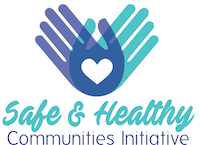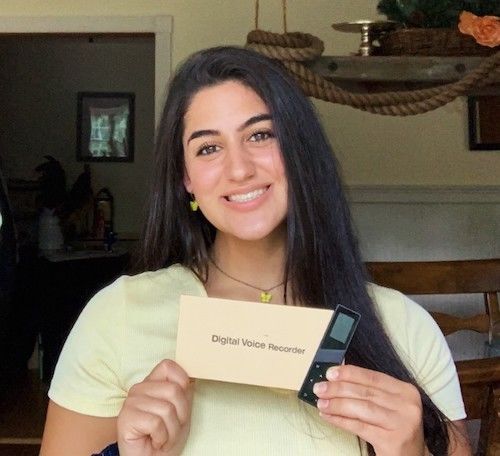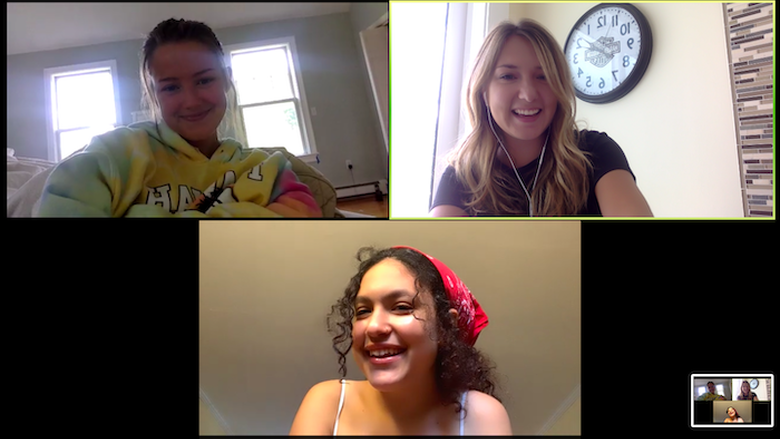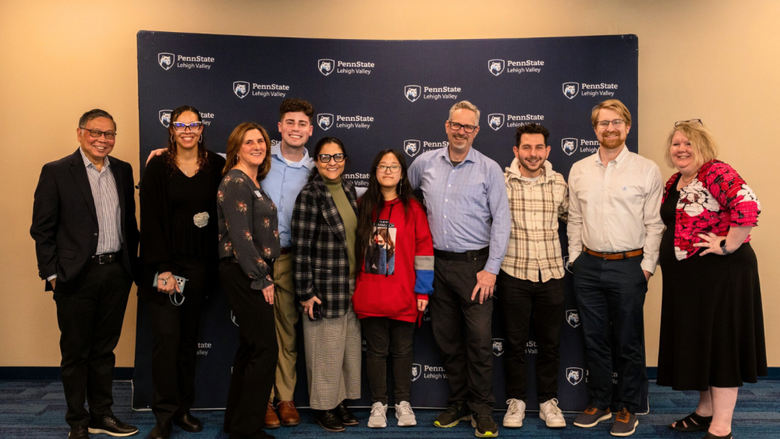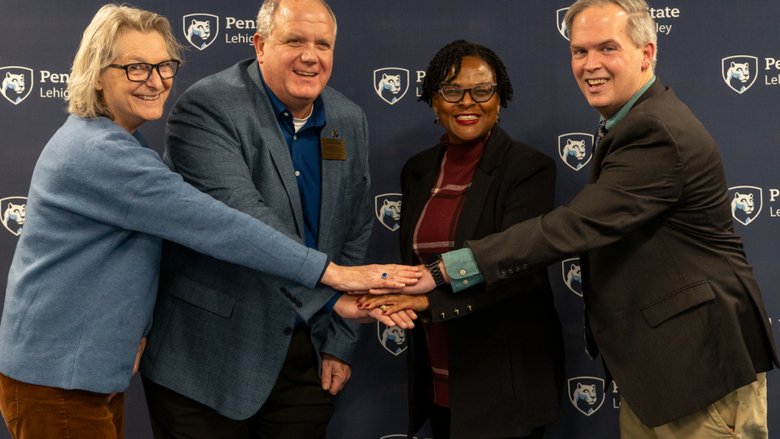A shipment of food and cleaning supplies arrives in San Luis Rio Colorado, Mexico, thanks to the organization Misión de Caridad.
UNIVERSITY PARK, Pa. — This summer 50 students received the Student Engagement Network’s (SEN) Remote Innovation Grants, and many of them are using those grants as a means to improve their communities and the lives of others.
In April, SEN announced it would offer $2,000 grants to students from any campus or academic field to support a virtual summer engagement experience. With the pandemic disrupting many planned engagement experiences such as internships and research opportunities, SEN leadership said they wanted students to continue thinking about their academic journey and be engaged learners.
“We were very impressed with the applicants in this new grant program,” said Michael Zeman, SEN director. “We have 50 students doing amazing work to help their peers and communities at a time when the whole world is experiencing an upheaval in their everyday lives. I also believe the Engagement Coaches, who are volunteer faculty and staff, deserve credit in helping students make the most of these experiences.”
Below are just four examples of the work being done within the SEN Remote Innovation Grant program.
Katie Walters — Adapting to a digital transition: The prevention of child maltreatment in crisis
This summer Walters is continuing her work with the Safe and Healthy Communities Initiative as a research assistant, which will also help her complete an internship to earn a child maltreatment and advocacy studies minor.
Walters is earning a bachelor’s degree in biobehavioral health and is a candidate for a masters of public health.
SHCI works to prevent child sexual abuse using evidence-based programs and methodologies in five Pennsylvania counties (with two counties participating as one applicant to the project). It is a cooperative project between Child Maltreatment Solutions Network and the Pennsylvania Commission on Crime and Delinquency. The SHCI Penn State team is led by Jennie Noll and Kate Guastaferro, and consists of Kathleen Zadzora and a number of undergraduate researchers.
Originally, Walters planned to only stay with the SHCI lab for a single semester.
“I chose to stay on the project throughout the rest of my undergraduate career (and now into my masters!) as I realized the impact that our work was having on child sexual abuse prevention efforts across the state of Pennsylvania,” she said. “While child sexual abuse is a topic that makes most people uncomfortable to talk about, it’s an incredibly important topic to educate parents, teachers, community members and children on. We cannot prevent or protect children from abuse without having the conversation about it, so that’s why this project has become so important to me.”
So far this summer, Walters said she and others at SHCI have been working to adapt pieces of the study to an online format since much of it was based upon data collected from classrooms. In the five counties that SHCI works in, they have been able to reach more than 10,000 adults, nearly 14,000 second graders and 80 parents.
Sarah Schaeffer — Making and donating soap to local communities in need
Shaeffer’s project aims to ship her homemade soap to State College area nonprofits during a time when soap may be in short supply.
“Before I even stepped foot on the Penn State University campus, I was amazed to see the bond between the student community and the local State College community,” Schaeffer said. “It is so evident to see the bond shared in all aspects of life, including philanthropic work.”
Schaeffer said that while there are national conversations happening about the importance of handwashing, soap might not be readily available. In addition to hygiene to help curb the spread of germs, the secondary goal of the project is to provide people with moisturizing soap to help them with self-care, something Schaeffer said might seem like a small contribution but can go a long way in making them feel valued.
“As someone interesting embarking on a potential career in non-profit work or entrepreneurship, being able to understand the process of creating a product to fulfill a need from start to finish can be extremely valuable,” she said. “By being given the opportunity to take a niche skill set that I have and make it conducive with community needs, I am practicing how to make the parts of my identity conducive to my civic responsibility of giving back.”
Schaeffer said she first got into soap making through the zero waste and sustainability movement.
“I saw it as an opportunity to control what was in my hygiene products and soon after I realized how little was actually needed to be in soap! All soap in its purest form is just oil, lye, and water! But there is so much in traditional soap that isn’t needed. All the soap I make is actually dyed with natural edible ingredients such as turmeric, lemon powder, coffee grounds, etc.”
Elizabeth Powderly — COVID kits for refugee families
Elizabeth Powderly is a volunteer with Misión de Caridad. This organization works to provide shelter and aid to refugee families at the U.S. and Mexican border in San Luis Rio Colorado, Mexico, just south of Yuma, Arizona. This town has been hard-hit by the coronavirus and many families are unable to obtain work, and therefore are lacking in cleaning supplies and food.
Powderly is working this summer with the donor database systems to organize the shipping of cleaning kits and donations received in Boston to the families in SLRC through the organization’s Feed-a-Family program.
“After my summer plans fell through due to COVID-19, I knew I still wanted to focus on my nonprofit work from last semester with Misión de Caridad,” Powderly said. “The Innovation Grant was a means to financially support myself this summer while also working to support refugee families at the border who have been impacted by COVID-19.”
“So far, the Feed-A-Family program has safely delivered over 11,000 fresh meals from local markets and businesses,” she said. “Additionally, the teams in Mexico have been able to deliver cleaning supplies and educational pamphlets about issues that are escalated by stay at home orders, such as depression and domestic abuse.”
Isabella Hanna — The effects of COVID-19 on the opioid epidemic
Hanna’s project will follow up a study she helped to author in 2019 on the secondary exposures of the opioid epidemic under principal investigator Jennifer Parker, associate professor of sociology at Penn State Lehigh Valley. The study is based on data from more than 1,200 college students in Pennsylvania.
“This study is very important to me because I get to experience the true voice of those who are exposed to opioid addicts on a daily basis and spread the word about what they go through and focus on them, instead of the opioid user themselves,” Hanna said.
Hanna, a health policy administration major, received approval from the Institutional Review Board for her new project and will be conducting 20 in-depth remote interviews of people who have connections to someone who misuses opioids or has died from overdose.
Her interviewing will explore how quarantining is shaping and complicating opioid misuse, how people are coping with the pandemic and how COVID-19 might be overshadowing the opioid epidemic.
Helping students grow from engagement experiences
Hailley Fargo, student engagement coordinator with University Libraries, who is serving as a faculty mentor to five grant recipients, including Walters, said she has loved learning more about the projects this summer.
“My small cohort of five students meets on a weekly basis, where we learn what happened in each experience during the week and have a space to share successes and challenges,” she said. “It allows me to learn more about great student engagement experiences and also expose those students to library resources and people they might not know about. I think having a mentor, who isn’t directly involved in the day-to-day work of the student engagement experience, but is still tuned in and providing feedback and encouragement really adds a nice layer to the experience overall.”
Fargo is also a member of the SEN’s Faculty Academy.
In addition to working with engagement coaches such as Fargo, students participating in the Innovation Grant program will complete a non-credit bearing Canvas course centered around the student engagement journey and critical life skills and SEN growth areas such as: civic responsibility, ethical leadership, multicultural awareness, and systems thinking.
Students interested in applying for or learning about SEN’s grants should check the grants page at engage.psu.edu. Typically, grants are awarded in three different cycles throughout the year.
The Student Engagement Network is a joint initiative between Undergraduate Education, Student Affairs and Outreach and Online Education. The mission of the Student Engagement Network is to advance the power of participation by connecting students with experiences that empower them to make a positive impact as citizens and leaders of the world.
